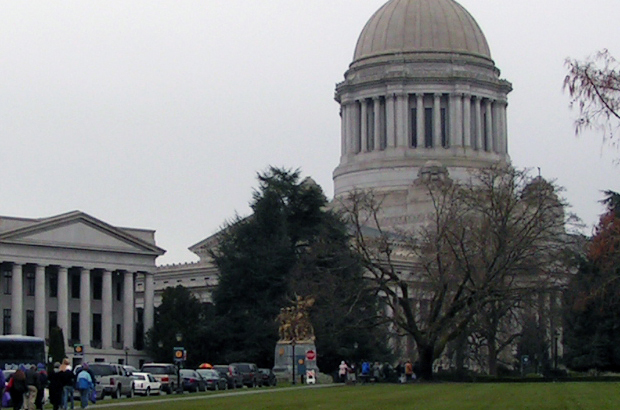After twelve turbulent weeks, complete with an unanticipated special session, Washington’s 2016 legislative session finally drew to a close on March 29th. This year’s session included setbacks for climate and clean energy, but took a number of valuable steps forward as well.
Fortunately, clean energy supporters can celebrate at least two victories: improving incentives for electric vehicles and an important procedural advance to support the closure and cleanup of two coal-fired power plants in Colstrip, MT.
Colstrip: After several rounds of lively negotiations, SB 6248 passed with bipartisan support on a vote of 92-5. Promoted by a broad coalition of energy activists and Puget Sound Energy, SB 6248 establishes an important financing mechanism for the closure and cleanup of two of the dirtiest coal-fired power plants in the country. Unlike a similar version from last year, this year’s package does not allow the purchase of additional coal power, contributing to cleaning Washington’s electric grid. When operations cease entirely, it will eliminate five million tons of carbon emissions annually, the largest single reduction in years.
The bill was shepherded by Sen. Doug Ericksen (R-Ferndale), Sen. Kevin Ranker (D-Orcas Island), and Rep. Jeff Morris (D-Mount Vernon).
Electric Vehicle Incentives: Bipartisan leadership from Rep. Jake Fey (D-Tacoma), Rep. Ed Orcutt (R-Kalama), and Sen. Curtis King (R- Yakima) was indispensable for passing HB 2778, a bill that raises the sales tax exemption eligibility for electric vehicles up to $42,500. This increase will allow forthcoming mid-market models such as the Chevy Bolt, the next generation Nissan Leaf, and the new Tesla Model 3 to qualify for the tax break. After federal and state support, all three will cost less than $30,000. Additionally, the legislature passed HB 2357, which encourages gas stations to install electric vehicle charging stations by creating a revolving loan and grant program.
Over the coming years, transportation pollution will account for more than half of Washington’s total carbon emissions inventory. Vehicle pollution not only poses a profound climate challenge, but also results directly in dangerous co-pollutants that lead to asthma and lung disease. We need an aggressive transportation electrification agenda, and these two bills help move the ball forward.
Despite these gains, legislators failed to pass HB 2346, a bill critical for extending the renewable energy incentives program and bolstering the thousands of jobs that make up Washington’s growing renewable energy industry. Senate Republicans stymied the bill by inserting language that effectively pitted the incentives against the state’s ability to reduce carbon pollution.
As in previous sessions, this year also saw several attempts to weaken I-937, Washington’s renewable portfolio standard. Several of these failed to pass out of the legislature, but one did move to the Governor’s desk. We deeply appreciate Governor Inslee’s commitment to growing renewable power and diversifying Washington electricity sources—he vetoed SB 6166 on April 1.
The 2016 legislative session took a number of meaningful steps forward and policymakers refused to roll back key environmental protections we already have. There is a lot of work to do in the coming months and year, but the first three months of the year were a great start.

